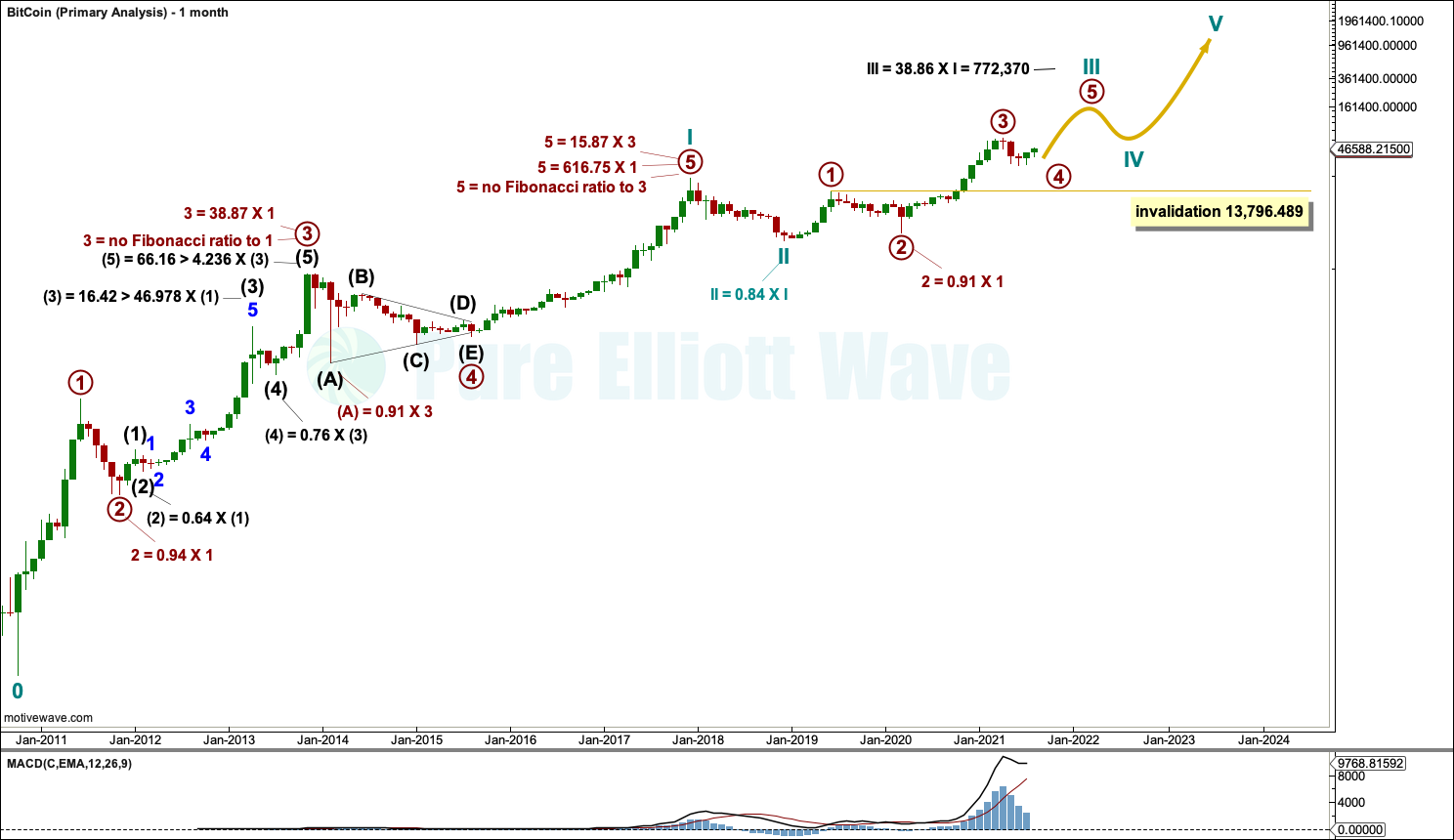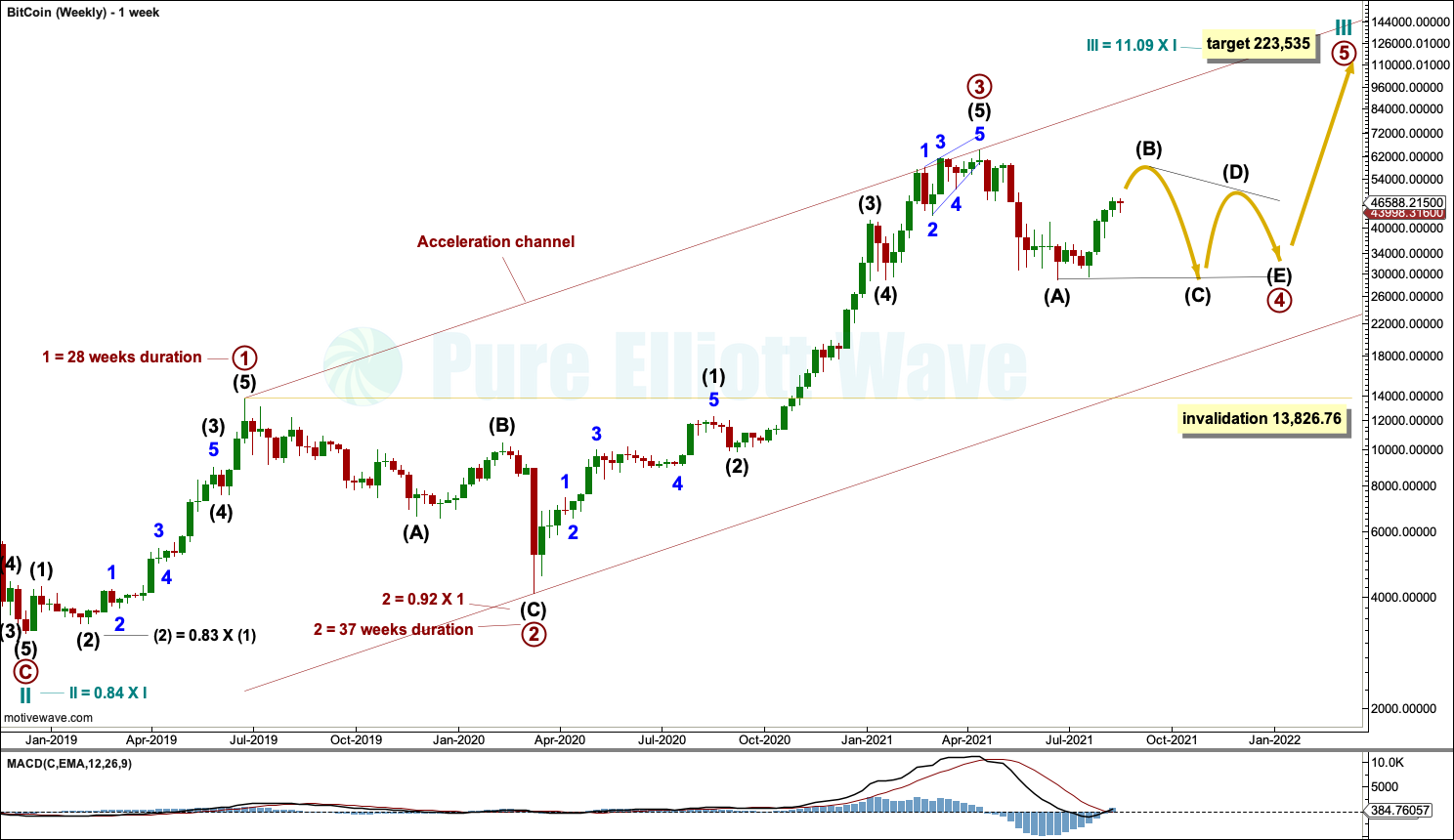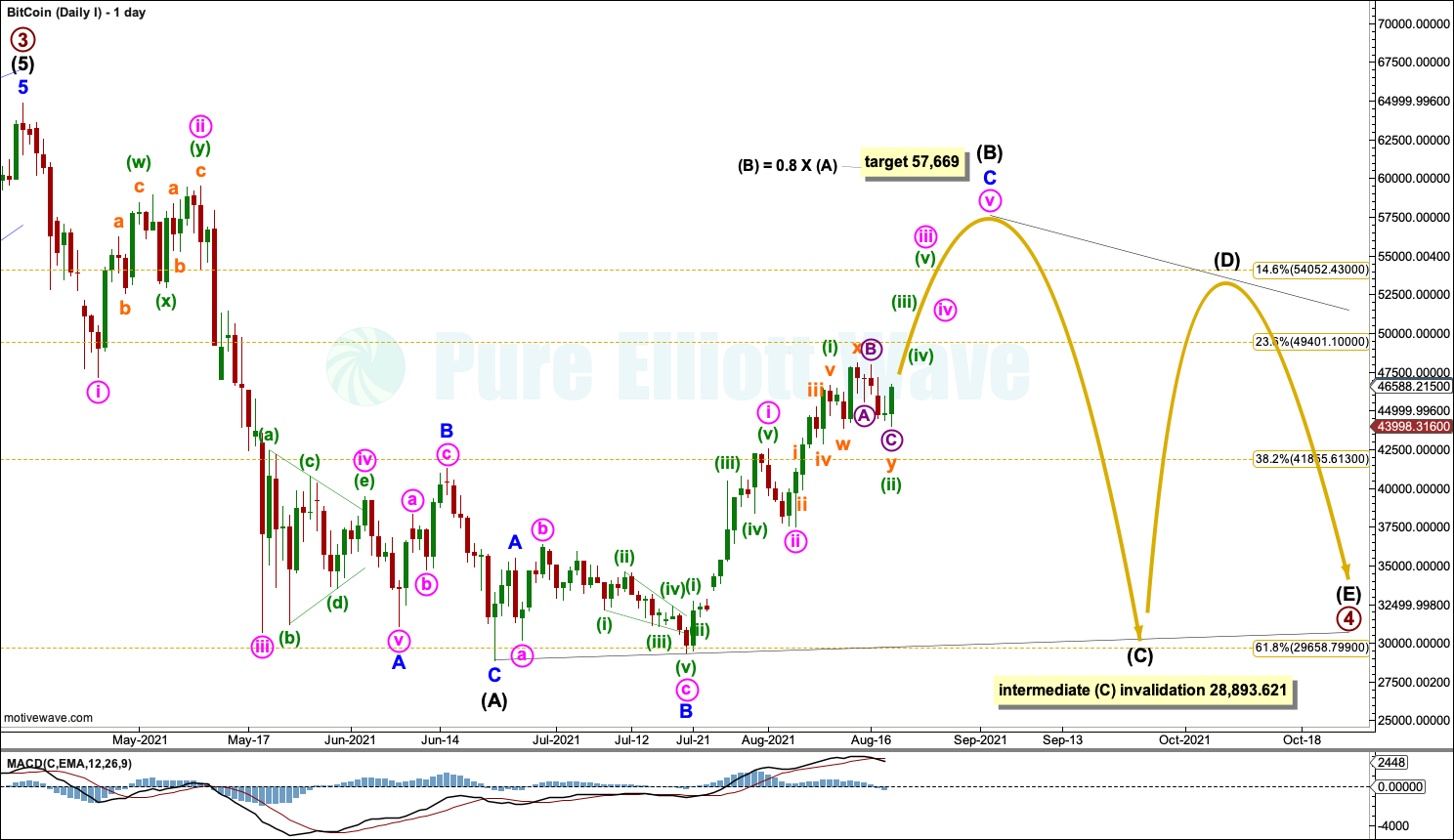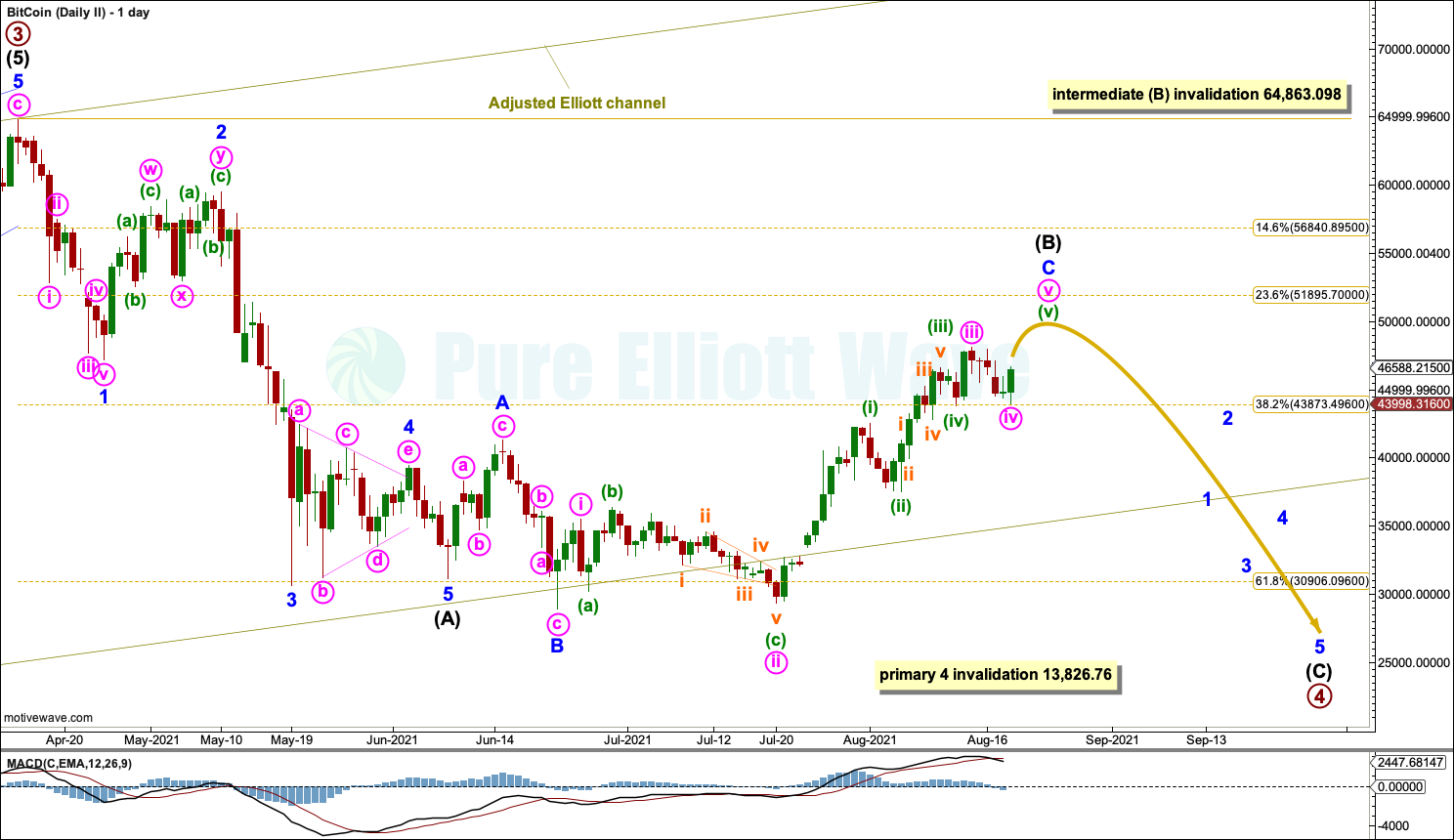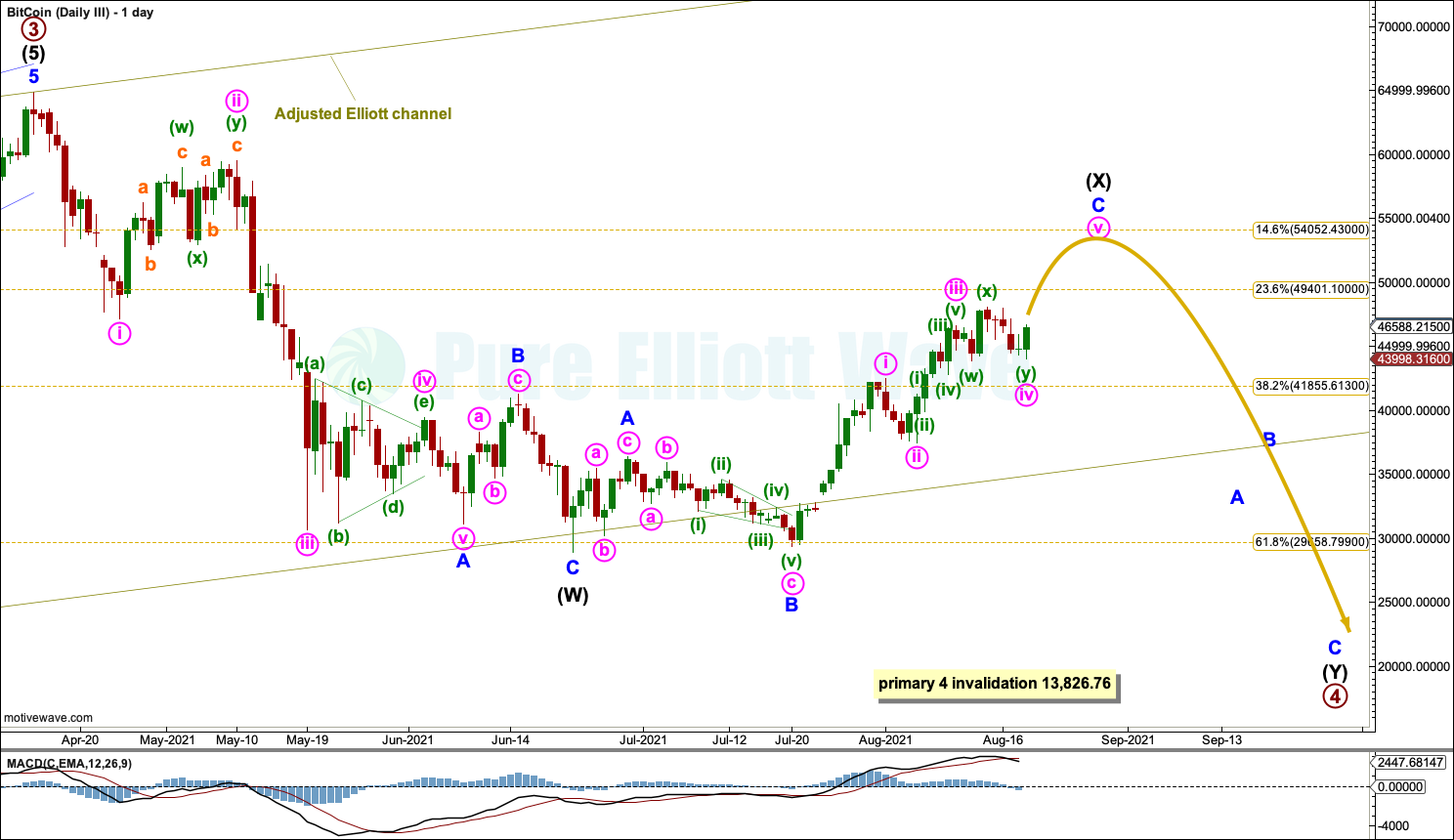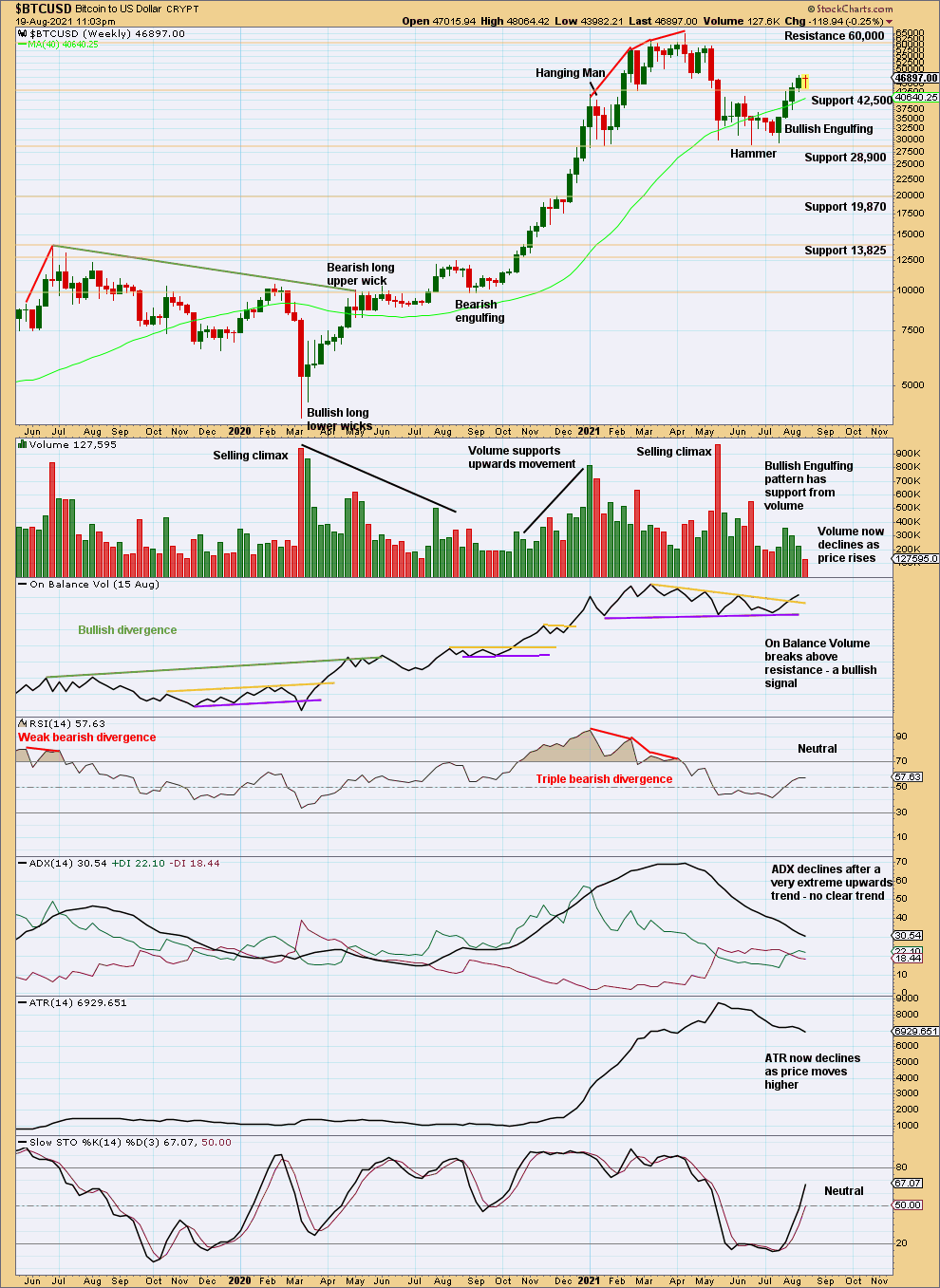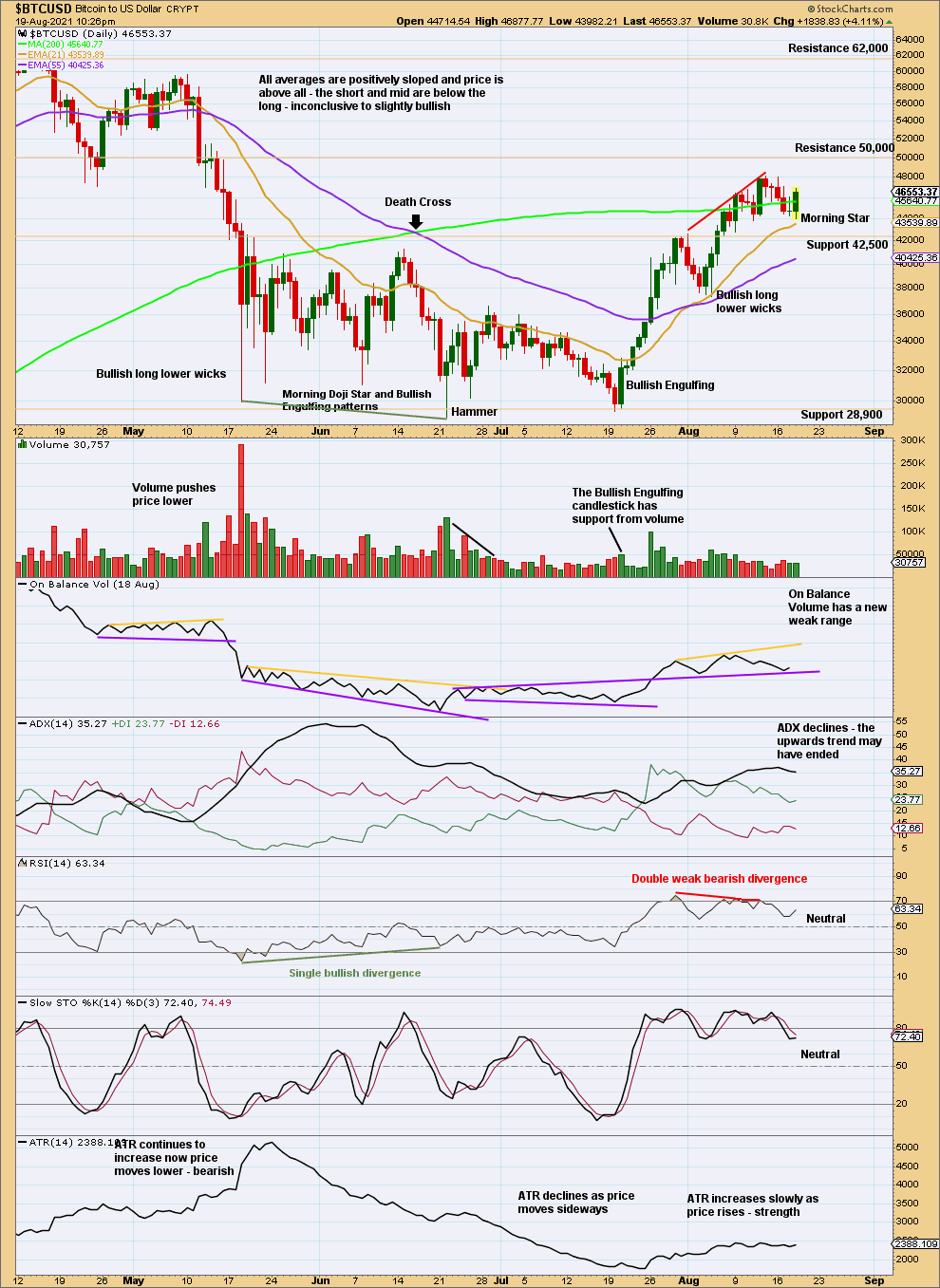BTCUSD: Elliott Wave and Technical Analysis – Charts – August 19, 2021
Last Bitcoin analysis, on August 11th, expected upwards movement towards a target about 57,669 as most likely. Since August 11th price has mostly moved sideways and a little higher.
Summary: At this stage, all three short-term daily Elliott wave counts expect more upwards movement. The target at 57,669 is approximate only. This upwards movement is expected to be a continuation of a much larger consolidation, which looks most likely to continue sideways as a triangle for a few more months.
The data used for this analysis comes from Yahoo Finance BTC-USD.
Monthly and weekly charts are on a semi-log scale. The close up daily chart is on an arithmetic scale.
For notes on identifying highs and lows for Bitcoin, see this article here.
MAIN ELLIOTT WAVE COUNT
MONTHLY
It is possible to see a completed five wave impulse upwards for Bitcoin to the high in December 2017. This has been followed by a deep three wave structure downwards to the low in December 2018.
I am unable to find many reasonable Fibonacci ratios within this wave count. It appears that Bitcoin may not exhibit Fibonacci ratios very often between its actionary waves, so this makes target calculation impossible. Classic technical analysis was used to identify a high in place on December 23, 2017.
What is very clear from this chart is that Bitcoin forms classic bubbles. It has done so now several times and is now doing so again. So far each bubble has popped and Bitcoin has collapsed, to then thereafter form a new bubble. Each bubble is larger than the one prior; so if another Bitcoin bubble is forming, it may be expected to take price substantially higher.
Bitcoin tends to behave like an extreme commodity: price moves upwards for about 2 – 4 weeks in a near vertical movement at the end of its rises. Following this vertical movement the resulting downwards movement is very deep (in percentage terms) and often very quick.
The next rise begins slowly with basing action over weeks or months, and then as the rise nears its end another vertical movement completes it. Also, there are volume spikes just before or at the end, which is another feature typical of commodity like behaviour.
This has happened now several times. The most notable instances are the rise up to the week ending 24th November 2013, the week ending 5th June 2011, the high on 17th December 2017 at 19,870.62 and the high on 26th June 2019 at 13,796. The following sharp drops were 94%, 93%, 84% and 91%,respectively.
WEEKLY
The weekly chart focusses on cycle wave III. Cycle wave III may only subdivide as an impulse. Within the impulse: Primary waves 1, 2 and 3 may now be complete, and primary wave 4 may now be underway.
Primary wave 4 may subdivide as any one of more than 23 possible corrective structures. It is impossible to be confident of the structure of a fourth wave until it is over; alternate wave counts and flexibility are essential during corrections. At this stage, it looks most likely to subdivide as a triangle. When primary wave 4 may be complete, then an upwards breakout would be expected for primary wave 5. Primary wave 5 would very likely be longer than primary wave 3 by many multiples; it is common for this market for its fifth waves to be very long.
Primary wave 4 may not move into primary wave 1 price territory below 13,826.76.
Draw an Elliott channel about cycle wave III (weekly charts are drawn on a semi-log scale). Draw the first trend line from the ends of primary waves 1 to 3, then place a parallel copy on the end of primary wave 2. If it is long lasting or deep enough, then primary wave 4 may find support about the lower edge of the channel. The same channel is drawn on daily charts, but daily charts are drawn on an arithmetic scale and the trend channel sits differently.
DAILY – FIRST
Primary wave 4 looks most likely to subdivide as a triangle if support about 29,000 holds. Technical analysis suggests it may.
The most common type of triangle is a regular contracting triangle, and the most common length for intermediate wave (B) would be about 0.8 the length of intermediate wave (A). This target is provided as an approximate guide only.
If primary wave 4 unfolds as a running triangle, then intermediate wave (B) may make a new price extreme beyond the start of intermediate wave (A) above 64,863.09. A new all time high does not mean that primary wave 4 would definitely be over.
Intermediate wave (C) within a contracting or barrier triangle may not move beyond the end of intermediate wave (A) below 28,893.621.
Intermediate wave (D) within a contracting or barrier triangle may not move reasonably beyond the end of intermediate wave (B).
Intermediate wave (E) within a contracting or barrier triangle may not move beyond the end of intermediate wave(C).
A triangle may take many months to complete.
At this stage, this first wave count has the best look and highest probability.
DAILY – SECOND
A new low below 28,893.621 would invalidate the first daily Elliott wave count and leave the second and third wave counts valid.
Primary wave 4 may subdivide as a single zigzag. Since primary wave 2 subdivided as a single zigzag, then this would provide no alternation in structure; however, alternation is a guideline and not a rule, and not always seen. A zigzag is the most common corrective structure by a wide margin, so this wave count must be considered as a possibility.
This week intermediate wave (B) is relabelled as a possible expanded flat. Within the expanded flat: Both minor waves A and B subdivide as threes, and minor wave C subdivides as an incomplete five wave impulse. Minute waves i, ii, iii and iv within minor wave C may be complete. Only one final small upwards wave may be required to complete minor wave C to complete intermediate wave (B),
DAILY – THIRD
It is also possible that primary wave 4 may subdivide as a double zigzag.
The first zigzag within the double zigzag labelled intermediate wave (W) may be complete. The double may now be joined by an incomplete three in the opposite direction, a regular flat labelled intermediate wave (X).
Regular flats normally have C waves that are reasonably close to equal in length with their A waves, but minor wave C within intermediate wave (X) is now much longer than minor wave A. This does not look like a normal regular flat and the probability of this wave count is reduced.
TECHNICAL ANALYSIS
WEEKLY
The prior upwards trend reached very extreme. Now support is holding strong about 28,900. Watch On Balance carefully for a signal soon.
On Balance Volume gives a bullish signal. Upwards movement may reasonably be expected to continue here to next resistance about 60,000, although there is a weaker cluster of resistance just below 60,000.
DAILY
Bullish candlestick patterns appear at the last three lows, and long lower wicks appear at the first four. Support is strong about 28,900. Bullish divergence at the low of June 22, 2021, between price and RSI after RSI neared oversold, strongly suggests a low may be in for Bitcoin. This supports the first daily Elliott wave count.
There is plenty of room for price to continue higher here before conditions may become extreme enough to suggest the upwards trend may be over.
A small pullback may have been enough to resolve weak bearish divergence between price and RSI. Now a bullish candlestick pattern and support from volume, while On Balance Volume remains above support, suggest upwards movement ahead.
Published @ 12:27 a.m. ET on August 20, 2021.
—
Careful risk management protects your investments.
Follow my two Golden Rules:
1. Invest only funds you can afford to lose.
2. Have an exit plan for both directions – where or when to take profit, and when to exit a losing investment.
—
New updates to this analysis are in bold.

